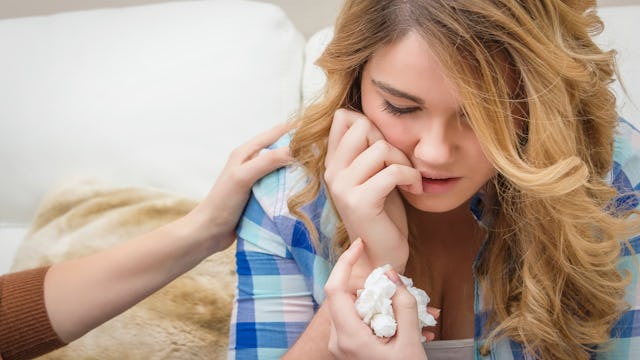5 Tips For Talking To Our Kids About Terrorist Attacks

For many parents, the unthinkable happened in Manchester, England: A lone suicide bomber set off a bomb at an Ariana Grande concert killing 22 and injuring 119 people. Most of those concertgoers were tweens, teens, and young adults. The youngest victim, Saffie Roussos, was just 8.
While we were all still reeling from this tragedy, another terrorist attack — this time on the London Bridge occurred on June 3.
Terrorism is the ultimate act of cowardice. Targeting children is beyond reprehensible. As with any terrorist attack, the media is all over the incident, providing up-to-the-minute information and all the horrific details, in both words and visuals. What set the Manchester bombing apart from other terrorist attacks is the way our tweens and teens are hooked into this particular news loop: Not only were their peers disproportionately singled out in this attack, but Ariana Grande is a tween icon and many of our kids follow her every move, mostly through social media. According to a recent study by Influence Central, 50% of kids have social media accounts by the time they’re 12.
While we are all shocked and deeply saddened by the Manchester bombing, many of our tweens and teens are experiencing firsthand fear and confusion around the attack. Finding out that kids just like them were killed and injured while at a pop concert is frightening. Having that information constantly appear in their social media feeds for days can bring up a complex mix of emotions over an extended period of time. For my tween, the news was incomprehensible, and she questioned if it was real or fake. Telling her it really happened was difficult, especially since we’ve promised to take her to a concert this summer as a birthday present.
What can we do as parents to support our kids when devastation strikes, and we ourselves are thrown off balance? In an interview on NPR station WBUR, Ellen Braaten, a child psychologist at Massachusetts General Hospital, offered this advice to help parents talk to their kids about the bombing:
Assure your kids that you are keeping them safe.
Make sure your children know that you and any other adults responsible for their well-being are doing their job and always working to keep them safe.
Do more listening than talking.
Find out what your child has heard rather than telling them what happened, then listen to how they feel about it. Be straightforward with your kids, but guide them away from the gory details and more toward expressing their feelings around it.
Share your feelings with your kids.
Depending on how old your child is, you can share your own feelings of fear or sadness about the tragedy. Kids can sense when you’re being brave for them and might even think it’s odd that you’re not showing any strong emotions around such a devastating event that affects so many families just like your own.
Maintain a consistent routine.
Kids thrive on routine, even when they challenge it. Knowing their daily lives aren’t changing in any big way because of this event helps them feel safe. For example, don’t suddenly put off a regular shopping trip because you’re worried about crowds. Letting your kids know it’s okay to continue their lives as usual and that it’s okay to be happy will reassure them.
Model good coping skills.
Our kids are always looking to us for guidance. In a situation like this, they’re watching to see how we deal with life’s uncertainties. It’s okay to talk about our own worries and let our kids know that, yes, sometimes life is scary, but we can get through it together. The key is to keep the conversation emotionally appropriate depending on your child’s age and what they can handle.
I’ve been poring over the news coming from England, struck by the horror of it all, and am sending my love across the ocean, especially to those families who have lost loved ones in these senseless acts. The news is mostly terrible, but in the midst of the terror and sorrow, I learned about the many acts of kindness by strangers. Directly after the blast, taxi drivers offered free rides to the fleeing crowds, and locals opened their homes to those who were stranded without transportation. A homeless man rushed into the melee to help a badly injured young girl and a woman in her 60s.
Talking with my tween about the attack, I made sure to tell her these stories of kindness and care. Even in the scariest situations, there are those willing to help. There is goodness and light. It’s so important that our children never forget to look for that light when they need it and be the light when they can.